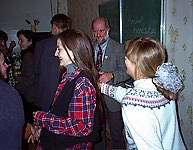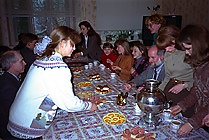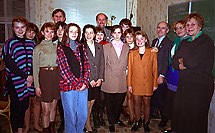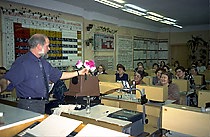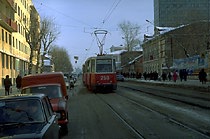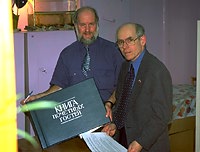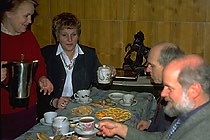Visiting Ms Gasheva Lyudmila Ionovna's 10th grade English class was certainly the highlight of my first full day in Perm on the Urals. Ms. Ionovna and her class of fifteen girls and one boy had thoughtfully prepared for their first ever visit with Americans.Go to Chapter 5


It was evident from the beginning that these students had an excellent command of the English language -- complete with very British accents. They also had a keen interest in life in America. Ed and I each introduced ourselves. I talked about my son Andrew, 11th grader, studied hard, chemistry, Russian, math, English, worked four hours each night, owned his own car, had a girlfriend named Siri, loved music, liked to read books, go to movies, shop for clothes. I was most proud of his good nature and pleasant disposition. Kelli, I told them, loved sports and animals and playing games. Wanted to be a veterinarian, was good at football (soccer.) Her kindness and thoughtfulness were most dear to my heart. The students asked dozens of questions about American teenagers, music, literature, movies, sports, cars, houses, schools... How much money do you make? Do they shampoo the streets in America? Are Negro people dangerous?
They wondered about the name "Siri" and were surprised that Americans sometimes choose unusual names or even make up names for their children. This does not happen here. Ever. The class loved my science tie with beakers, flasks, molecules and a microscope. The class was supposed to last one hour at the end of the school day but ended up lasting 3 1/2 hours, until 6:15 PM. Midway through Ms. Ionovna announced that the class had prepared two surprises for us. First they sang (loudly!) "America the Beautiful." Then they all got up and we practiced a square dance. Ed and I participated and Ms. Ionovna was surprised that I hadn't square danced since 6th grade. Square dancing in Perm, Russia! At 5:30 the class served tea and cookies and presented us with small gifts. I got a cast iron "Puss-in-Boots," made at a famous factory in nearby Chelyabinsk, Siberia. On the way to the tramvye (electric streetcar) I asked one student if her parents would be worried that she was so late. She said "Yes, but I'll have so much to tell them about!"
We visited three public schools in Perm. Earlier in the day, at Perm School #137, the yeasty smell of freshly baked bread filled the hallways. The delicious smell came from "blini," sometimes called "maslinsa," -- Daughter of Frost, which are special pancakes made from milk, eggs, butter and yeast -- foods that would be forbidden next week according to Russian Orthodox tradition in observance of Lent. This was National Pancake Week across all of Russia! Sergei did not understand why I thought this was funny... Maslinsa are very tasty. Rather than pancake syrup, Russians use sour cream, spicy salsa, olives, smoked fish, etc. (but not all at once!) The pancakes are rolled up like a Russian soft shell taco. (I used strawberry jam.)
At Perm School #137 Valentines adorned the hallways -- all in English. This is a new holiday in a new Russia and it was catching on very quickly. We visited a first grade English language class. The teacher, whom was introduced simply as Farida, followed a lesson plan of fun learning activities: The class played games such as "The Telephone Game," and "Stepping Stones to the Zoo." When they played "Stand Up, Sit Down, Put your hands on your head," some students were able to be the teacher. Farida addressed her students individually as "my little dear" -- with a very British accent. The children stood beside their desk to answer questions. The girls wore dresses and the boys wore ties and even some blazers. Posters, maps, balloons and animal pictures hung on the wall. The classroom rules, displayed in English included:
Be Kind to Each Other
Keep Our Schoolroom Tidy
Put Things Away
Shake Hands with Adults
Don't Play Rough
It was obvious that the students loved this class. They never got bored or fidgety. A team of pedagogical evaluators were also present. One woman who looked like she was from the "old guard" scowled disapprovingly and wrote comments continuously on her notepad. At the end of class, Farida awarded stars for achievement, 1-4 per student, which she wrote on their wrists with a ball point pen.
At the third school we visited an 11th grade history class. Students graduate after 11th grade. In Soviet days, history was linked to ideology and the former wasn't always accurate or complete. Thus, history teachers are all having an identity crisis. This particular teacher linked history and literature and made extensive use of quotes. The lesson was conducted in Russian so I had plenty of time to look around. Most of the students dressed like American teenagers, long hair, short hair, nice sweaters, some sloppy but most were neat. A few carried briefcases. No one slept or exhibited disrespectful behavior. Lots of students raised hands to be called upon. Looking around: Russian linoleum is joined by aluminum strips nailed to the floor. Tears in the linoleum were patched with more aluminum sheets. Some floors were completely patchworked! Its not unusual to see a water or sewer pipe cutting across the floor in the middle of a classroom. Careful not to trip! Stairs are also an occasional problem. At prestigious Perm State University, we had to use one flight of stairs in which the first step was two inches higher than all of the others except for the last step which was four inches lower than the others. Careful not to trip!
Ed, Sergei and I are staying in a dormitory for new faculty. The dorm has a small cafeteria staffed by two people. I never saw anyone actually eat there, however. There is a room with a ping pong table and I was able to play against a Russian from Siberia. (Chalk one up for the USA team!) In our dorm room there is a bedroom with two beds and in the living room a sofa bed. The living room has a refrigerator and a desk. The room is very hot. The bedroom is comfortable because the windows don't shut properly and there is a comfortable draft. The shower has no shower curtain and the toilet has no toilet seat. Tomorrow we do our first program in Perm. One final note: There are almost no beards in Russia. In the early 18th century, Peter the Great encouraged men to shave to look more like western Europeans. You can see the change to shaved faces by visiting an art museum! He also introduced Russians to coffee, although tea remains equally popular.
Da-svee-dan-ya. (Note: The recipe for blini is given at the end of this book.)
Back to the Table of Contents
